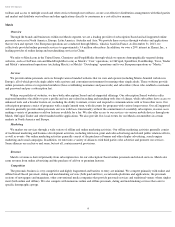ServiceMagic 2013 Annual Report Download - page 19
Download and view the complete annual report
Please find page 19 of the 2013 ServiceMagic annual report below. You can navigate through the pages in the report by either clicking on the pages listed below, or by using the keyword search tool below to find specific information within the annual report.
Table of Contents
We operate in various international markets, some in which we have limited experience. As a result, we face additional risks in connection
with our international operations. Also, we may not be able to successfully expand into new, or further into our existing, international
markets.
We currently operate in various jurisdictions abroad and may continue to expand our international presence. In order for our products and
services in these jurisdictions to achieve widespread acceptance, commercial use and acceptance of the internet must continue to grow, which
growth may occur at slower rates than those experienced in the United States. Moreover, we must continue to successfully tailor our products
and services to the unique customs and cultures of foreign jurisdictions, which can be difficult and costly and the failure to do so could slow our
international growth and adversely impact our business, financial condition and results of operations.
Operating abroad, particularly in jurisdictions where we have limited experience, exposes us to additional risks. For example, we may
experience difficulties in managing international operations due to distance, language and cultural differences, including issues associated with
the establishment of management systems and infrastructures (including disclosure controls and procedures and internal control over financial
reporting), the staffing of foreign operations, exchange rate fluctuations and online privacy and protection of personal information. Our success
in international markets will also depend, in part, on our ability to identify potential acquisition candidates, joint venture or other partners, and to
enter into arrangements with these parties on favorable terms and successfully integrate their businesses and operations with our own.
A variety of new laws, or new interpretations of existing laws, could subject us to claims or otherwise harm our business.
We are subject to a variety of laws in the U.S. and abroad that are costly to comply with, can result in negative publicity and diversion of
management time and effort and can subject us to claims or other remedies. Some of these laws, such as income, sales, use, value1added and
other tax laws and consumer protection laws, are applicable to businesses generally and others are unique to the various types of businesses in
which we are engaged. Many of these laws were adopted prior to the advent of the internet and related technologies and, as a result, do not
contemplate or address the unique issues of the internet and related technologies. Laws that do reference the internet are being interpreted by the
courts, but their applicability and scope remain uncertain.
For example, through our various businesses we post and link to third party content, including third party advertisements, links and
websites. We also allow users to submit content, such as comments, photographs and videos. We could be subject to liability for posting, hosting
or linking to third party content, and while we generally require third parties to indemnify us for related claims, we may not be able to enforce
our indemnification rights. Some laws, including the Communications Decency Act, or CDA, and the Digital Millennium Copyright Act, or
DMCA, limit our liability for posting or linking to third party content. For example, the DMCA generally protects online service providers from
claims of copyright infringement based on the storage of third party content at the direction of the user, so long as certain statutory requirements
are satisfied. However, the scope and applicability of the DMCA are subject to judicial interpretation and, as such, remain uncertain, and the
U.S. Congress may enact legislation affecting (and potentially limiting) the protections afforded by the DMCA to online service providers.
Moreover, similar protections may not exist in other jurisdictions in which our various businesses operate. As a result, claims have been, and
could be, threatened and filed under both U.S. and foreign laws based upon use of third party content asserting, among other things, negligence,
defamation, invasion of privacy or right or publicity, copyright infringement or trademark infringement.
In addition, changing internet business practices may attract increased legal and regulatory attention. One example of such changing
practices is the advent of so-called “native” advertising, a form of advertising in which sponsored content is presented in a manner that some
may view as similar to traditional editorial content. The U.S. Federal Trade Commission recently indicated that it will be monitoring the use of
online native advertising to ensure that it is presented in a manner that is not confusing or deceptive to consumers.
Any failure on our part to comply with applicable laws may subject us to additional liabilities, which could adversely affect our business,
financial condition and results of operations. In addition, if the laws to which we are currently subject are amended or interpreted adversely to
our interests, or if new adverse laws are adopted, our products and services might need to be modified to comply with such laws, which would
increase our costs and could result in decreased demand for our products and services to the extent that we pass on such costs to our customers.
Specifically, in the case of tax laws, positions that we have taken or will take are subject to interpretation by the relevant taxing authorities.
While we believe that the positions we have taken to date comply with applicable law, there can be no assurances that the relevant taxing
authorities will not take a contrary position, and if so, that such positions will not adversely affect us. Any events of this nature could adversely
affect our business, financial condition and results of operations.
16
























